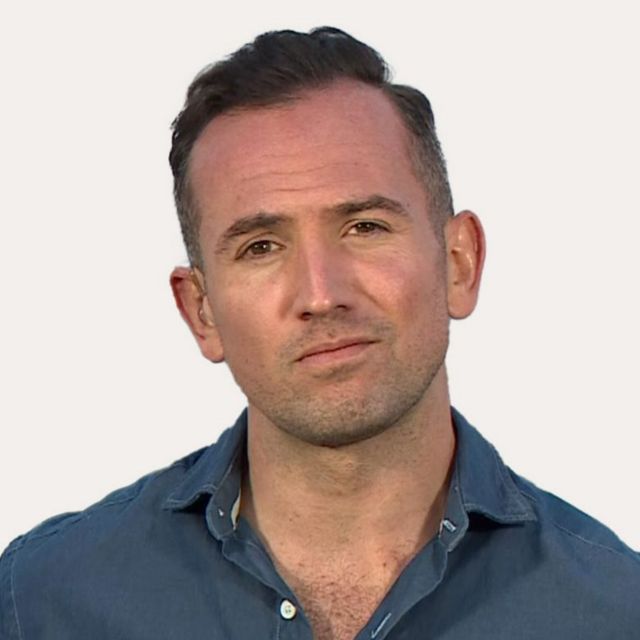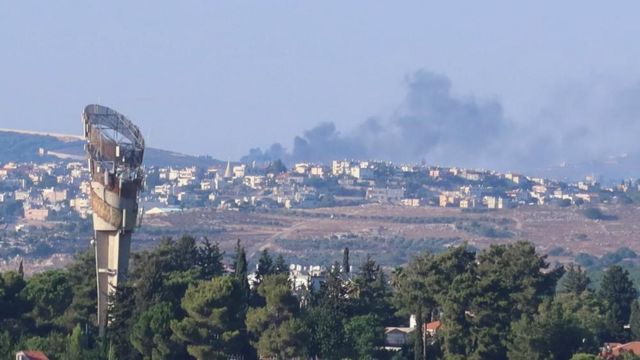Funerals have been taking place for the victims of a rocket strike in the Israeli-occupied Golan Heights
At least 12 people, including children, were killed on Saturday when a rocket hit a football pitch in Majdal Shams
Israel has blamed Hezbollah, but the Lebanese militant group strongly denies any involvement
Early on Sunday, the IDF said it had conducted air strikes against seven Hezbollah targets "deep inside Lebanese territory"
Israel and Hezbollah have been exchanging fire regularly since October, when the Israel-Gaza war began
Israeli PM Benjamin Netanyahu vowed said Hezbollah would "pay a heavy price", but US Secretary of State Antony Blinken said he didn't want to see the conflict escalate.
Netanyahu arrives back in Israel after US visit
Israeli Prime Minister Benjamin Netanyahu has arrived back in Israel following his visit to the US, and is heading for a security assessment and Security Cabinet discussion, a statement from his office says.
While in the US met US President Joe Biden, as well as with Vice President Kamala Harris - who is tipped to become the Democratic Party's presidential candidate - and former President Donald Trump.
Netanyahu and Biden discussed efforts towards a ceasefire deal and the release of hostages and also held a closed-door meeting with the families of seven US citizens still being held hostage by Hamas in Gaza.
Lebanon waiting to see how Israel will respond
Hugo Bachega
reporting from BeirutFor months, life in Lebanon has been dominated by the question of whether this country will be dragged into another war with Israel by Hezbollah.
The group started the strikes on 8 October, the day after the deadly Hamas attack on Israel, saying they are in support for Palestinians in Gaza.
Most of the violence has been contained to border areas, and both Israel and Hezbollah have given indications they were trying to avoid an all-out conflict, which could have catastrophic consequences.
But there has always been the risk of miscalculation. Saturday’s attack on Majdal Shams, the deadliest in the current violence between Israel and Hezbollah, could have been just that.
Israel has blamed the group, which has denied involvement.
But Hezbollah, seen as a significantly more formidable foe than Hamas, has been preparing for another major confrontation with Israel since their last one, in 2006.
REUTERSFighting has been taking place on the Israeli-Lebanese border for months
Hezbollah has about 150,000 rockets and missiles, according to Western estimates, which could overwhelm Israel’s sophisticated air defence systems.
The arsenal also includes attack drones and precision guided missiles capable of striking deep inside Israel.
In Israel, Prime Minister Benjamin Netanyahu has promised that Hezbollah will “pay a heavy price which it has not paid up to now” for what happened.
Officials have repeatedly described the near-daily cross-border attacks by the group as unacceptable and, under growing pressure to act to allow the return of tens of thousands of displaced residents, they have threatened to do to Beirut what they have done to Gaza.
Lebanon is now waiting to see how Israel will respond. Israel has repeatedly hit areas in the south and in the Bekaa Valey, areas where Hezbollah operates.
Its promised strong response could target places that, so far, have been untouched by the war, and open up an unpredictable and dangerous phase in the fighting. THIS AND MORE UPDATES AT: Golan Heights latest: Fears of full-scale war between Israel and Hezbollah after strike kills children




No comments:
Post a Comment